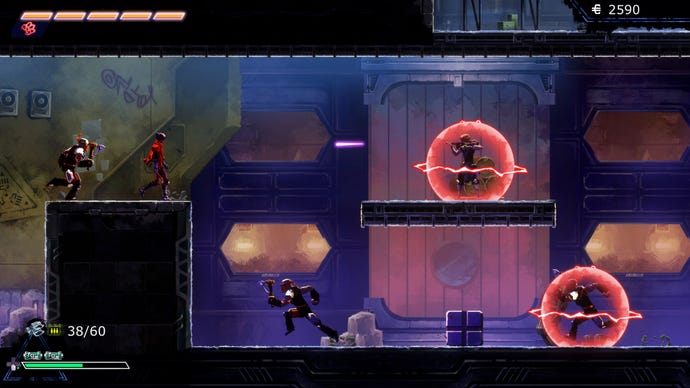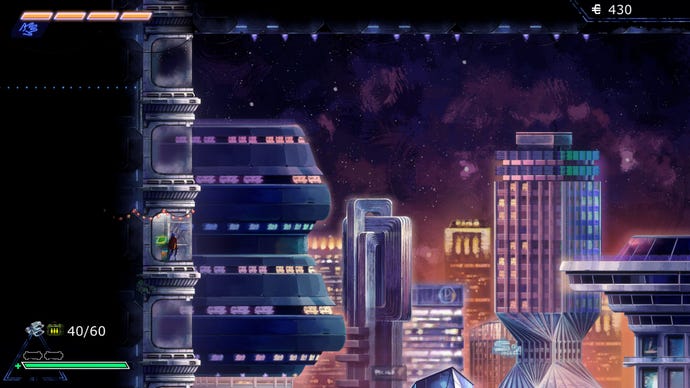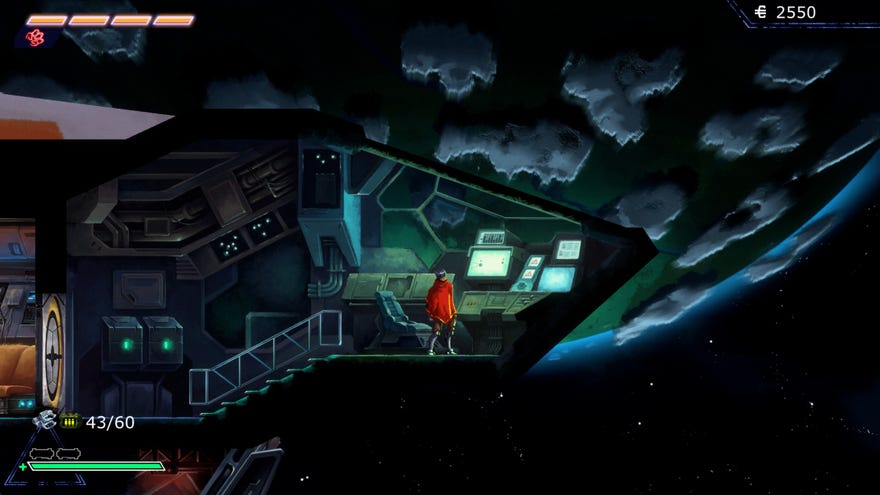They Always Run review: a 2D space-western with some rough edges
Still better than live-action Cowboy Bebop
They Always Run is the closest I’ve come to living out my dream of being a galactic bounty hunter. It’s a 2D platformer with two distinct halves to its gameplay. One portion is a rewarding parkour simulator, and the other’s this heavy, visceral combat system that I never got tired of. You play as a three-armed mutant called Aiden as he hops between planets collecting bounties, which are presented through a series of action-platformer linear levels. It almost never goes as planned. The title’s pretty accurate.
Chasing after bounties is one of the best parts of the game. You move in a freeform way that conserves your speed as you jump or fall down between platforms, and there’s a button to help vault over smaller objects in your way. It becomes an execution test, all about trying to hit the buttons in the most efficient way possible. It really helps you get into roleplaying Aiden, too. If he’s this amazing galactic bounty hunter, then it would make sense for him to completely perfect his way through the game, right? It reminded me a lot of Katana Zero or Hotline Miami, in that every time I slipped up and made a mistake, I always wanted to restart just so I could find the cleanest way through.
The combat in They Always Run borrows from this philosophy too. You start with a basic three-hit combo, a counter and a dodge. The special ingredient, though, is Aiden’s third arm. It bursts through enemy defences and shields like they’re nothing, and it has an arcade-y feeling every time you use it. You have to physically push the right stick in the direction you want to fling his arm. It’s like firing an extremely responsive slingshot every time, right down to the windup and pullback.
His arm is a finite resource, for some reason, and you can only build charges of it by countering enemies. I love that developers Alawar Premium did this; it forces you to use every single tool in your kit. I started off only wanting to use my basic attack and my third arm, but having to use everything drives you to think more creatively.
I struggled with snipers at the start, as there were always tons of shielded guards in the way. Once I got more familiar with Aiden’s potential, I instinctively knew I had to dodge past the guards, take out the sniper first, and work my way back. What I’m trying to say is, the game is unbelievable when it’s being an Oldboy corridor scene simulator.

There’s a detailed story underpinning the events of the game too, and it’s one that celebrates the genre's cliches. I can’t say the story cemented itself as a classic for me, but it was more than fine for what it was doing, and it wears every single one of its influences on its sleeve. Literally! The main character has a poncho that’s very similar to Clint Eastwood’s in The Man With No Name trilogy.
The dialogue in They Always Run deserves a special mention, though, as it makes the entire experience very endearing. There’s a real back and forth between Aiden and his partner Jonathan, balancing a tone of serious business with an extreme familiarity. They’re just trying to get their bounties done, but aren’t afraid to start calling each other out on their bullshit. When this was at its best, it reminded me of the lighter-hearted side of Cowboy Bebop. None of the characters in They Always Run are untouchable power fantasies, either. It’s more Jackie Chan, less Schwarzenegger.
"When the dialogue was at its best, it reminded me of the lighter-hearted side of Cowboy Bebop."
The bounty hunting structure gives the game a brilliant pacing behind it. You make incremental progress towards the larger, overaching story, but at the same time every level feels like you’ve closed the book on a smaller chapter. They’re all filled with set pieces and events that are unique to each of them, and it helps to add to that planet-exploration quality.
The art direction goes a long way to help support this feeling. I was jumping from neon pink worlds with dusty architecture, to overgrown junkyards that had maybe spent too much time unattended. There’s a painterly quality to everything, almost like you can see the brush strokes on the watercolour designs. Everything feels handcrafted, and it helps prevent the cyberpunk society in They Always Run from coming across as a completely soulless dystopia. The animations share this eye for detail as well; they were always incredibly satisfying while still efficient at conveying parts of Aiden’s personality with every gesture he made.
But despite how many things They Always Run gets right, there’s a massive asterisk that comes with trying to play it. You need to meet the game halfway. As much as I enjoyed my time with it, They Always Run is fairly rough around the edges. It's quite buggy, and sometimes I was honsestly confused as to whether a failure was the game’s fault or mine (it was usually both).

I played They Always Run over a month after it launched, and based on the feedback from other players it looks like I saw a substantially different version. Over the past few weeks, Alawar Premium have patched the game and altered the design to make it far less agonising to play. It could definitely still do with a lot more polish, but I never felt actively frustrated. The version I played had a robust checkpoint system, was very generous with placing them, and there was barely any loading time between death and being alive again.
Although, the bit I never reconciled with were the boss battles. Luckily, they’re few and far between, but they completely rip out everything the game is good at. They Always Run excels when you’re moving fast and shredding through huge groups of enemies like they’re paper, but every boss leaves you trapped in a small room with a single enemy to hammer against. I was quite happy they went with a full health bar system during moments like these, because you’d often need to tank hits to get through the fights. The collision detection wasn’t very good at capturing precision, and (as you might have guessed from the game’s title), Aiden doesn’t exactly like moving slowly.
For better or worse, there’s nothing else like They Always Run. Whenever I could look past the tons of bugs, I was left with this eclectic thrill-ride of sci-fi action adventure. The potential of the game shines through every crack, and I really hope they end up making a sequel to build on what they’ve done here. Please. Most space-western fans are so starved that we’ll take anything remotely good.









